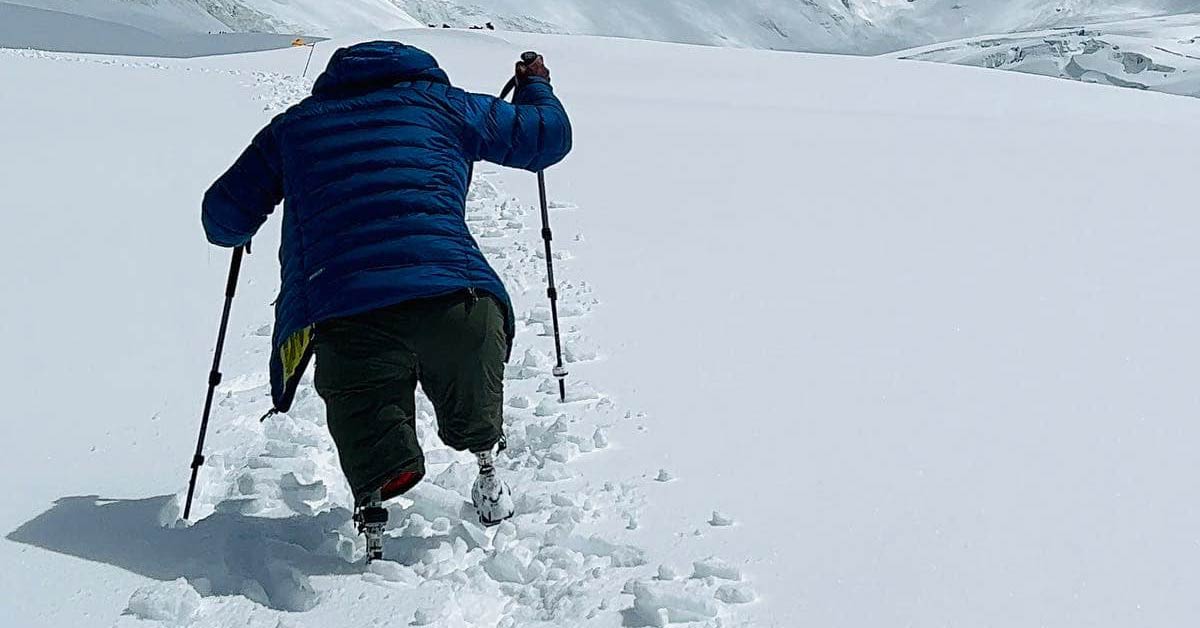Site Navigation
Double Amputee Hari Sets His Sights on Everest

A Childhood Dream to Climb Mount Everest
Hari Budha Magar is an inspiration to us all. After losing both his legs above the knee in Afghanistan in 2010, he is determined to make his childhood dream a reality. Hari wants to become the first double amputee to summit Mount Everest.

A Life Changing Injury
Hari was injured in April 2010 in Afghanistan. After an improvised explosive device (IED) exploded. It changed his life forever.
“I have been massively impacted by my injury. I was quite motivated, but I couldn’t quite adapt my life. It was also hard for my family to adapt their life with me too. I couldn’t go to the places that I used to be able to go to. I couldn’t play sports that I used to play with my children. There are a lot of ways it has changed our lives.”

He struggled with coming to terms with such a life changing injury. To suddenly have to adapt to a life without your legs is a huge mountain to overcome.
“Initially I thought my life was over. I grew up in Nepal and I left at 19. I grew up in a different society where disability is seen as a burden of the earth. Where I grew up, I have seen how badly some people who have disabilities are treated.
It was really hard. I was uneducated, I wasn’t told anything about disabilities. About what you could do, I just didn’t know at that time. I thought my life was finished. I thought I was going to be in a wheelchair for the rest of my life. I thought that I would need a carer for the rest of my life.

And I thought maybe, I’ll just stay at home and do nothing. That’s how I thought my life would be spent. But that wasn’t the case, I would later find out.”
The Confidence to Climb Mountains
After the accident, it took a leap of faith for Hari to learn that, even without his legs, he could still do whatever he set his mind to.
“I was very depressed, I felt worthless and very insecure. Then one point I went skydiving. After skydiving when I landed safely on the ground, I realised, yeah, you can do the things you want to do.”

Blesma, The Limbless Veterans charity helped him come to terms with his injury, showing him that he can do anything that he sets his mind to.
Blesma are dedicated to assisting serving and ex-service men and women who have suffered life-changing limb loss or the loss of use of a limb, an eye or loss of sight. They helped Hari build up his confidence in a variety of sporting ventures. Eventually leading him to conquer some of the world’s most challenging climbs.
“I tried to do all things, all the sports and events that exist. So, I was doing lots of things and I found out that you can do all the things you want to do, just in a different way.
I went skiing with Blesma in Colorado twice. I used to ski with both my legs standing, now I do it with the one sitting. I can still go as fast as I used to.”



A Life Line
Blesma supported Hari from day one, offering a helping hand which enabled him adjust to his new life.
“Blesma is an amazing charity who actually came to my hospital bed after the incident. They helped me to fill out my compensation forms. I can still remember Bill and Kit. The came and told me that I was eligible. Together we started to fill in my forms. They helped me from day one.
In my eyes they are one of my favourite charities. They do the best job. Later on, they adapted my garage with an electric door, so I didn’t need to come out from my car. They even helped me with my climbing, and so many things that still help me out. I’m sure they will help me for the rest of my life.”
A Mountain Climber
Hari’s drive and determination to succeed is inspirational. Before deciding to climb Mount Everest, he trained with some other mountains to ready himself.
“I have done Ben Nevis with my GM X3s Long Legs. I also climbed Kilimanjaro, mostly with my same leg. And I climbed Mount Toubkal, which we did to raise funds for Blesma as well. We also did Thelu, which is in Nepal and is over 6000 metres high. Mera Peak is 6,476 metres, the highest I have done so far.”

Why Everest?
When asked his motivations for choosing to climb the world’s tallest and dangerous mountain, he explaimed:
“This is my childhood dream. I tried when I was in service as well. You have to train, and you have to have lots of money, so I couldn’t afford to do that. But you know, when I was skiing out in Colorado, I looked at the snowy peaks I thought how am I going to do it?

When I was small, I grew up looking at the mountain every day. Also in our school textbooks, we read about who climbed it first, what is the highest peak in the world, and it’s Everest and it’s in Nepal. Us Nepalese are very proud of that.”
A Ban on Mount Everest
Before Hari could begin conquering his childhood dream, there were several obstacles he had to endure first. Not only did Hari have to wait for Covid to pass, but he also had to overturn the Nepalese government’s rule that banned any double amputee from climbing Mount Everest.

This was a huge task to face even before reaching Everest.
“That was bigger than climbing Mount Everest. It’s the right of about a billion of people, you know, in the world. You can’t just ban the people because you have this, and you have that. That shouldn’t happen. You can’t take away someone’s right.
So, yeah, I think this was bigger than climbing Everest.”
The Road to Mount Everest
For even the most able bodied climber, Mount Everest is a dangerous and difficult mission. So, for Hari to undertake this climb is no mean feat.

“It will take two months. Not just for me, but for all of us because we need to acclimatise first. Then we have to wait for the summit window and when the weather gets better, we can summit.”
Forever Grateful
Hari will be eternally grateful to Blesma, who helped him through one of the most difficult periods of his life. They helped him learn that his life was not over. That it is simply different. The fact he now has the confidence to climb Mount Everest shows just how life changing their support has been.
So much so that Hari wants to give back to Blesma at every point he can.

“If I can help them slightly it will be great for me to do whatever I can. It will be great giving them something back. This is what it’s all about, you know, for other people who give their time and money and so that people who are in need can get help.
In all our life it doesn’t go up, up, up all the way like this, right, it goes up and down, up and down. And when you go deep down, I see that as a flash flood. We need help when that flash flood comes.
That is the time charities help us. Charities like a Blesma, helped me out to cross the flash flood and allowed me to get to the other side so I’m safe. Then I can help other people. So that’s what I am trying to do hopefully. By climbing a mountain or giving an interview or attending events. They have helped me, so I want to help them back.”

You Don’t Have to Climb Mount Everest
You don’t have to climb Mount Everest like Hari. For ONLY £1 per week, you can play make a smile lottery to support Blesma.
They rely on this reliable regular income to help other Injured and Limbless Veterans just like Hari.

Sign up to support today.















